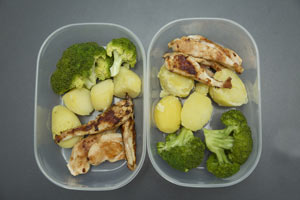
Most plastic food storage containers contain a slew of chemicals, with some being more toxic than others, but the storing part might not be the biggest problem. The bigger concern is the tendency to pop these containers out of the fridge and into the microwave.
What’s in your container?
Plastic food containers come in many shapes and sizes and can be made from any number of chemicals. Unfortunately, many of these chemicals are possible contributing factors to health problems such as various neurological disorders, high blood pressure and many other diseases and health-related issues in both young children and adults alike.
Concerns over the use of chemicals in containers that come in direct contact with the foods we eat have been around for some time. Because of this, some manufacturers have switched to alternative materials. However, there’s always the possibility that the use of new chemicals will simply bring about new health issues.
What are you really having for lunch?
Many consumers mainly use these convenient containers to take leftovers to the office for lunch or to pack healthy snacks for their kids at school. If you are like most, you may be thinking it’s not such a big deal if your food is only in them for a couple of hours.
While storing food for an hour or two might not be too bad, the real trouble starts when these same containers are used to heat up your leftovers in a microwave, as the heat can release toxic substances directly into the food. That’s probably not what you had in mind when you carefully packed your healthy, home cooked food this morning.
A safer bet
It may be a stretch to ask time-strapped consumers to avoid using the microwave altogether, but it’s not that difficult to make the switch to using only glass or ceramic containers. They may be slightly heavier to tote to work or school, and they will need to be packed a bit more carefully, but these are small sacrifices to make in order to avoid ingesting any toxic chemicals.
If you want to go a step further and cut down on your microwave use when possible, leave those leftovers at home and heat them in the oven for a quick dinner during the week. Instead, pack a chilled garden salad or homemade egg salad sandwich for your lunch.
For more articles go to http://lifesportfitness.lifestyleezine.com
